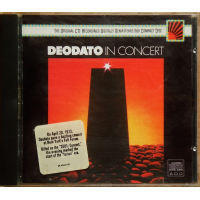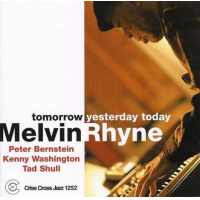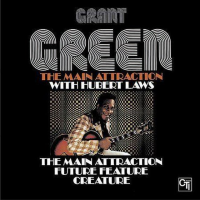Home » Jazz Articles » Liner Notes » David Hazeltine: Inversions
David Hazeltine: Inversions
When it comes to New York's top-shelf gigs, few pianists get the job done like David Hazeltine. Much sought after for his sensitivity as an accompanist, Hazeltine is also an inventive composer and arranger who is able to bring a fresh approach to the mainstream. He is a modern day master who is capable of making it look and sound so much easier that it really is and he's not alone in his efforts at making the indefinable seem so natural. Regular collaborators Eric Alexander, John Webber, and Joe Farnsworth have developed a rapport that supports a style of music that sits squarely within the tradition, but speaks with its own individuality.
Again, to the naked eye, it might seem that Inversions is yet another routine effort in a genre that Criss Cross has fostered for several decades now. Hazeltine himself confesses that "sometimes style gets in the way of music in a certain sense and it's always been challenging to keep that in check." Furthermore, one might get the impression that familiarity among band members might breed complacency as opposed to inspiration. Yet nothing could be farther from the truth.
Hazeltine admits to being "very comfortable with the guys." But he finds new ways to challenge himself and his colleagues. "I try to do that in the writing and conception of tunes. It might not even be things that non-musicians would notice necessarily unless you really step back and listen to each piece as a whole on another kind of level. In other words, no costumes change. It's more that the fabric of the music itself [changes.] I like to use that as the springboard for changing things up and for variations."
The comfort level between Hazeltine and Alexander is one that has developed over many years and via frequent collaboration both in the studio and on the bandstand. Often, when one is on the scene, the other is not but a few steps away. "It's not just that it's comfortable," says David. "But it's that within that comfort zone, Eric is always stretching himself and always trying to play some different kind of stuff. I really enjoy that about him and part of what makes it comfortable is that you just count on that and when he's not around you say, 'Where's that guy who's always reaching out?'"
When it comes to bassist John Webber and drummer Joe Farnsworth, the two have locked up with Hazeltine on numerous occasions. They also contribute mightily to the band One for All, a hard bop ensemble that has been together for close to fifteen years. With thirteen records in their catalog, including five for Criss Cross, this band of leaders carries the torch in terms of what it means to keep a group of musicians together for the purpose of achieving a common goal.
Considering Farnsworth, his work can be easily taken for granted, considering the multitude of drummers these days that put complexity at a premium over musicality. "Joe reaches for something else and digs in even harder," explains Hazeltine. "It's amazing that he has the artistic integrity and perseverance to dig in even harder and play even straighter. He just has this vision and this idea of what he wants music to sound like and he goes for it. He used to be a lot busier. So it's amazing that this guy gets older and more mature, but not busier. It's all happening underneath the surface and that's what I love about him."
The ringer here who adds further textures to what is already a rich tapestry of sound is Steve Nelson, the vibraphonist previously making a brief appearance on Hazeltine's A World for Her (Criss 1170) way back in 1997. "I do like the tenor and vibes combination and I did one a couple of years ago with Eric and Joe Locke," David says. "I just wanted to try it with a different vibes player. So I wanted to experiment with the idea of working with Steve." Oddly enough, the two have run into each other while on the road, but have had few occasions to actually work together. This would hardly be discernable from the given results and one would have to agree with Hazeltine's summation that Nelson is "very good at adapting to the situation at hand."
Looking at the program of material that Hazeltine has put together, three of his originals add further to a distinguished catalog of pieces that manage to find new ways to stretch the boundaries of the mainstream vernacular. "Inversions" is an aptly titled affair that boasts an up-tempo Latin feel and further significance according to David. "As I got to thinking about it, there's a thread of inversions at work throughout the disc in a lot of senses. There are a couple of tunes where the bass line is standing out there almost like a melody and is inverted in that sense. And that is certainly the case for this tune. It also has inverted chords and voicings throughout."
Another of David's pieces, "For Cedar," pays homage to the sterling hard bop pianist Cedar Walton. It can also be heard on trumpeter Jim Rotondi's recent set, The Move (Criss 1323). Eric and Steve voice the melody together in counterpoint to lines from David's left hand. "I tried to use some of the melodic and harmonic movements that Cedar uses in his tunes and tried to make it sound not like a Cedar tune, but like a piece where the person who wrote it had Cedar in mind."
Rounding out David's originals, "A Lil' Bit" has a looping quality with some unexpected hits and a 2/4 feel that ultimately settles into a solid four beats to the bar. "That one has inversions in it in that the melody is based on moving voices in chords and moving bass lines," says Hazeltine. "There's a part of the melody in the middle that is similar to what a bassist would do and then there's a part of the melody at the top that contains inner voicings that a pianist might do." Webber's only solo statement of the date can be found right before the reprise of the head.
Alexander tips his hat to the pianist via his own contribution to the date, "Dave's System." A military-like fanfare from Farnsworth ushers in the descending figures that constitute the melody line, delivered in unison by Steve and Eric the first time and then just by Steve, with Eric adding some fills, the second time through. As for the significance of its title, David quips, "Eric is always talking about systems. He talks about George Coleman's system, the system to play over dominants, and this system and that system. We recorded that on one of Eric's records a few years back. I was flattered that he wrote me a song and it fit in well with the general mix of things."
The remainder of the program consists of standards, updated with just enough panache to keep them workable vehicles for expression. "Loverman" is the 1941 chestnut written for Billie Holiday and subsequently sung by a plethora of vocalists from Chris Connor to Norah Jones. It serves largely as a vehicle for Nelson, whose fluid lines and lightning fast runs are often heady displays. Also from '41, Cole Porter's "Everything I Love" provides a showcase for Farnsworth's tasty brushwork. It's been said that playing with brushes is somewhat of a lost art these days among drummers. Fortunately, the future is in good hands when it comes to Joe's contributions.
A large part of Dizzy Gillespie's legacy was fashioned on the manner in which he mixed Afro-Cuban rhythms with straight ahead jazz sensibilities. "Tin Tin Deo" has never quite sounded the way that it does here, the tempo hitting the upper extreme for much of its duration. By contrast, "Aki's Blues" settles in for a medium tempo groove, the number first performed by the late Buddy Montgomery for a 1997 trio recording. "Eric and I had been playing another tune of Buddy's called "Blues for David," explains Hazeltine. "But I heard this on an old funky tape that I had and I've always really liked it. It's similar in that it's a 24 bar blues."
Looking back on his efforts, Hazeltine seems pleased with the results of his latest endeavor, quickly giving credit to the men who helped him map out the possibilities. "Probably more than on any other date that I've done, this one involved [much] input from the sideman," says David. "There was enough openness to it that everybody had something to say about something and got involved in the actual running of the show, so to speak. Usually the leader dictates what's going on, but in this case it was very much a group effort in terms of little decisions that had to be made and little nuances."
Liner Notes copyright © 2026 C. Andrew Hovan.
Inversions can be purchased here.
Contact C. Andrew Hovan at All About Jazz.
An avid audiophile and music collector, Chris Hovan is a Cleveland-based writer / photographer / musician.
Track Listing
Aki's Blues; For Cedar; A Lil' Bit; Inversions; Loverman; Dave's System; Everything I Love; Tin Tin Deo
Personnel
David Hazeltine
pianoEric Alexander
saxophone, tenorSteve Nelson
vibraphoneJohn Webber
bass, acousticJoe Farnsworth
drumsAlbum information
Title: Inversions | Year Released: 2010 | Record Label: Criss Cross
Tags
PREVIOUS / NEXT
Support All About Jazz
 All About Jazz has been a pillar of jazz since 1995, championing it as an art form and, more importantly, supporting the musicians who make it. Our enduring commitment has made "AAJ" one of the most culturally important websites of its kind, read by hundreds of thousands of fans, musicians and industry figures every month.
All About Jazz has been a pillar of jazz since 1995, championing it as an art form and, more importantly, supporting the musicians who make it. Our enduring commitment has made "AAJ" one of the most culturally important websites of its kind, read by hundreds of thousands of fans, musicians and industry figures every month.

























